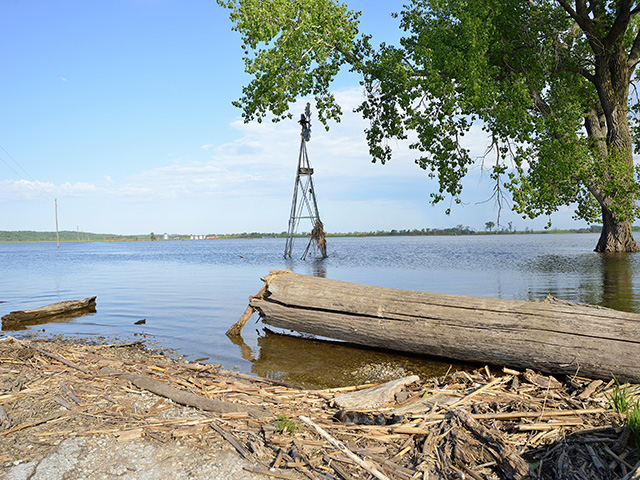Lawmakers, USDA Weigh Climate Options
Boozman: Firm Understanding of Carbon Markets, How They Affect Farmers Needed
OMAHA (DTN) -- Economic opportunity for farmers may be significant in addressing climate change, but the ranking member on the Senate Agriculture, Nutrition and Forestry Committee said on Tuesday that USDA and federal lawmakers should take a cautious approach to developing programs.
Sen. John Boozman, R-Ark., said during the Agri-Pulse Ag and Food Policy summit that whether a future includes a carbon bank, expanded conservation or other measures, farmers need to have a head seat at the climate table.
"We need to utilize the practical knowledge and expertise that exists within the agricultural sector," he said.
"Every day, a farmer considers the costs and benefits of his or her actions. And this is a practice that should be applied to our climate change policy development. While the possibilities for greater farmer engagement in greenhouse gas markets are exciting, there are also daunting realities that stand in the way for most farmers."
Complicating the potential opportunity, he said, is finding the best methods for measuring and verifying the carbon sequestered on farms or greenhouse gas reductions associated with certain agricultural practices.
Boozman said it is both difficult and costly, and the "economic disruption" caused by the COVID-19 pandemic is "still acutely felt" by producers.
"Experimental practices designed to address climate change through agriculture may be difficult or cost-prohibitive for farmers to adopt," he said.
"We must keep in mind that most of these market activities, converting agricultural practices into a credit that is sold on an offset market are just developing, with 2020 being the first-year market transactions occurred."
Not only will it be important to have a firm understanding of carbon markets, Boozman said, but also on how proposed policies might affect developing markets and agricultural stakeholders.
P[L1] D[0x0] M[300x250] OOP[F] ADUNIT[] T[]
In addition, he said there will continue to be questions from lawmakers and policymakers about the appropriate role for government.
"I believe we should first work through our existing voluntary conservation programs, which are incentivized and often provide cost-share assistance, as the basis of any climate-related agricultural policies," Boozman said.
"We should not take the road of heavy-handed regulation. It certainly serves to increase cost and drag consolidation. Additionally, our regulatory-approval processes must be structured to promote thorough and timely reviews for approving innovative technologies. Upholding risk-based regulatory review processes should be central to our policies on climate change."
Though USDA under the Biden administration is considering the establishment of a carbon bank, Boozman said information is lacking.
"Other potential roles the government could play with regard to agriculture and climate change such as operating a carbon bank or establishing standards by which all voluntary markets must operate are topics that we have few details on, and are still learning about," Boozman said. "We must tread lightly there. There is no silver bullet here; we must remain flexible in our approach to address climate change as the science and technologies develop this reality."
MORE ON CARBON BANK
Whether a carbon bank is developed for farmers and ranchers may come down to a debate in Washington about whether the agency has authority to use the Commodity Credit Corp.
On Monday, U.S. Secretary of Agriculture Tom Vilsack said the CCC is under consideration for such a bank.
Robert Bonnie, deputy chief of staff for policy and climate adviser at USDA, said on Tuesday during the summit that whatever role the agency plays on climate will require both sides of the aisle to come together.
"Well, bipartisanship is going to be critical in anything we do on climate change," he said.
"If we want policy to last for the long term, we're going to need to build support. That's part of the reason you're seeing the emphasis on outreach to stakeholders now, and as I said, that's going to continue, as we think about carbon bank or other tools, that that outreach is going to be critical."
Bonnie is a proponent of using the CCC to establish a carbon bank. He is the lead author on a Climate 21 Project transition memorandum on actions USDA should take on climate, https://climate21.org/…, calling for a carbon bank during the first 100 days of the Biden administration.
"We want to work with the stakeholder community; we want to work with folks on the hill," Bonnie said.
"We believe we do have the authority in the CCC. One of the important aspects of the CCC that's talked about in the charter is expanding existing markets, creating new markets for U.S. agricultural commodities. If we can use tools in the department, including the Commodity Credit Corp., to bolster those markets to create new market opportunities you heard the (agriculture) secretary talk about yesterday, then I think that that's a good use of the authorities."
He said USDA recognizes programs will have to match agriculture's diversity. USDA programs directed at climate, Bonnie said, will require a wide variety of tools to match that diversity.
"We're going to need a toolbox that has some flexibility in it to deal with the different aspects, the different challenges, faced by agricultural producers, forest landowners and others," he said.
The agency is seeing a lot of interest in carbon markets, investment in carbon credits and climate-smart agriculture. Both producers and agribusinesses, Bonnie said, have started to invest in solutions. Considering agriculture accounts for about 2% of the carbon market and about 10% of overall emissions, he said there is opportunity.
"Are there things you could do to invest in those markets that would invite more private capital in whatever we do, carbon bank or otherwise?" he said. "We don't want to compete with private capital; we want to invite private capital and private investment into agriculture and forestry."
Todd Neeley can be reached at todd.neeley@dtn.com
Follow him on Twitter @toddneeleyDTN
(c) Copyright 2021 DTN, LLC. All rights reserved.




